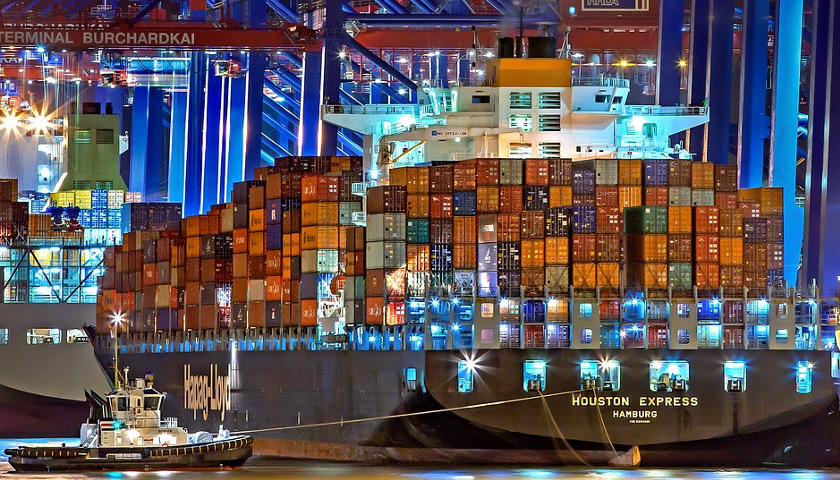by Spencer P. Morrison
Steve Hanke recently set out to prove “why President Trump’s trade message and protectionist policies are rubbish” in a Forbes article. Instead, the Johns Hopkins University economist exposed himself as a word-mincing, logic-twisting sophist – just like every other intellectual mercenary associated with the faux-libertarian propaganda mill that is the Cato Institute.
Hanke’s argument: trade deficits don’t exist, China is not screwing America, and President Trump (the village idiot) is jousting windmills. The real problem is lazy Americans who shop-til-they-drop and demand welfare “gimmies” from Uncle Sam.
Faust’s Bargain
Hanke begins his argument by explaining that trade deficits don’t really exist. Instead, the goods trade deficit is simply one half of the equation:
In economics, identities play an important role. These identities are obtained by equating two different breakdowns of a single aggregate. Identities are interesting, and usually important, by definition. In national income accounting, the following identity can be derived. It is the key to understanding the trade deficit.
(Imports – Exports ) ≡ (Investment – Savings) + (Government Spending – Taxes)
Given this identity, which must hold, the trade deficit is equal to the excess of private sector investment over savings, plus the excess of government spending over tax revenue. So, the counterpart of the trade deficit is the sum of the private sector deficit and the government deficit (federal + state and local). The U.S. trade deficit, therefore, is just the mirror image of what is happening in the U.S. domestic economy. If expenditures in the U.S. exceed the incomes produced in the U.S., which they do, the excess expenditures will be met by an excess of imports over exports (read: a trade deficit).
This is true. In his esoteric discussion of “identities,” however, Hanke neglects to mention the practical consequences of running a goods trade deficit. Although the books are balanced, reality shows us that it matters how they are balanced – there are two sides to every coin, but heads is not the same as tails.
I’ve explained previously how America sold its soul for Chinese trinkets. You should read the full article – it is my personal favorite. If you don’t have time, here’s a quick summary:
When a nation imports (buys) more than it exports (sells) it runs a trade deficit. America’s goods trade deficit was $796 billion in 2017. Sadly, there are no free lunches. To pay for these goods America sells more services than it buys (think banking and tourism). This helps, but still leaves us $566 billion in the red. To balance the books, America also sells assets and debt.
Assets include real estate, artifacts, shares in corporations – anything of value that was produced in the past. Selling assets is not always bad. For example, selling your mothballed Harley to buy a home gym might be wise. However, pawning your great-grandma’s wedding ring to buy groceries is not. Context matters.
On the whole, America’s asset sales resemble pawning great-grandma’s wedding ring. Consider that foreigners bought $153 billion worth of American real estate in the 2016-2017 fiscal year – everything from New York penthouses to Nebraskan ranches. This has the negative downstream effect of increasing housing prices and rents, in addition to the social problems associated with absentee landlords.
The United States also sells billions in equities (ownership of U.S. corporations and the associated profits). As of 2017, foreigners owned roughly 38 percent of American equities, when including foreign direct investments and foreign portfolio investments. This is up from just 12 percent in 2007, and the number is growing fast.
America pays for the rest of the deficit by selling debt. This is reflected in the endless growth of U.S. public and private debt levels. For example, foreign investors own over 44 percent of America’s national public debt, valued at more than $6.3 trillion. Hanke is good enough to mention this figure in his article, but erroneously reverses the causal sequence. Further, foreign investors own nearly 30 percent of all U.S. corporate bonds and a large percentage of America’s (monstrous) private debt.
America pays for foreign goods by selling our inheritance and mortgaging our future. In turn, we surrender control of our nation to foreign masters. Conversely, if America ran a trade surplus we would be purchasing foreign assets and debts – we’d be buying-up the world like Great Britain during the 19th century.
Who cares if the books are balanced? What matters is how they’re balanced.
Skyfall
Hanke’s second line of argumentation is that trade deficits – assuming they exist – aren’t a problem. After all, “the U.S. has run a trade deficit every year since 1976, and the U.S. has done relatively well since then.” Hanke needs to get out more. The sky isn’t just falling. It fell.
Not only is the trade deficit largely to blame for America’s ballooning debt and skyrocketing housing costs, it also costs Americans jobs and increases inequality.
Trade deficits destroy jobs. Consider that the North American Free Trade Agreement displaces a net 840,000 American manufacturing jobs. How? Offshoring led to trade deficits with Mexico. Before NAFTA, tariffs protected American industries from asymmetrical Mexican competition by normalizing price externalities. In other words, tariffs raised the cost of Mexican goods to account for the fact that American businesses were subject to higher labor, environmental, and quality standards. Essentially, tariffs penalized companies that moved abroad to avoid American laws. This resulted in balanced bilateral trade.
NAFTA eliminated many market barriers and forced American workers to compete directly with cheap Mexican labor. This created a powerful incentive to move American factories to Mexico – and move they did. Lori Wallach, director of Public Citizen’s Global Trade Watch, estimates that NAFTA redistributed a net 840,000 American manufacturing jobs to Mexico. Meanwhile, the Economic Policy Institute estimated in 2013 that NAFTA displaced a net 700,000 American workers. Finally, U.S. Trade Representative Robert Lighthizer also noted in a press release that NAFTA cost the United States 700,000 jobs. Remember, these are net figures: they include the jobs NAFTA created by boosting American exports.
NAFTA also displaces a large number of service jobs. This is because manufacturing is an anchor industry upon which predicate industries depend. For example, hairdressers and accountants move to towns with mines or factories – not vice versa. The Bureau of Economic Analysis estimates that each manufacturing job supports roughly 1.5 service jobs because of the multiplier effect. In short, NAFTA costs America a net 1.7 million jobs.
This problem is not to specific to NAFTA – the logic of market asymmetries means that whenever America (freely) trades with a poorer country, the inevitable trade deficit will destroy more (American) jobs than it creates because labor-intensive industries are the most-likely to offshore. After all, they have the most to gain from lower wages.
The trade deficit also hurts America by increasing economic – and therefore political and social – . The driving force behind inequality is, once again, offshoring. Moving millions of manufacturing jobs abroad creates unemployment. It also results in more competition for the remaining blue collar jobs – therefore decreasing wages for everyone else. This is basic supply-and-demand in action. It is not a coincidence that wages have stagnated for the vast majority of Americans since our nation began running chronic trade deficits in the 1970s.
Inequality is not merely an economic problem – it’s a political and social problem. Why? Too much inequality destabilizes society. Aristotle recognized this in his Politics, and recommended that the state should be governed by a large, robust middle class. Likewise, the godfather of modern conservatism, Edmund Burke, noted that inequality was one of the primary reasons France succumbed to its bloody revolution. The main point here is that societies function best when everyone has something to lose should they collapse. Ipso facto, inequality matters.
A Dragon Fed
Hanke’s final point is “the trade deficit is not made by foreigners who engage in unfair trade practices.” Instead, it is a home-grown problem.
I suppose Professor Hanke has never heard of China before. China’s entire trade regime was designed to fleece American consumers. For example, when China opened its doors to American investment in 1985, it specifically focused on export-oriented industries. Companies that built factories in China with the express purpose of exporting the production were given generous subsidies and access to artificially cheap labor. From the beginning of its resurgence, China’s goal was to be the seller, not the buyer.
A BBC Radio program on which I was featured noted that China meticulously follows the dictates of the World Trade Organization (WTO) today. Although this point is often made by academics like Hanke, it’s not compelling. Who cares if China plays by the rules now? At this point they’ve already secured an insurmountable competitive advantage in manufacturing due to the law of increasing returns – the bigger the factory, the cheaper its production. The Chinese abused the rules when it was to their benefit, and now attempt to uphold them for their benefit. “International law” is meaningless to China. The Chinese only care about wealth.
One of the main reasons America runs a trade deficit with China is that China jealously guards its lucrative domestic market. By and large, Western companies cannot operate in China. Those granted the privilege are often forced into “partnerships” with Chinese companies, which siphon-off a portion of the profits and serve as important vectors for intellectual property theft – this costs America up to $600 billion annually. This practice allowed China to evolve an independent and hugely profitable economic ecosystem. Just look at China’s information technologies sector: by blocking Amazon, China preserved the market niche for a domestic competitor, Alibaba. Today, Alibaba is one of China’s most valuable companies, and is Amazon’s only viable global competitor.
Contrary to what Hanke claims, China is indeed ripping us off. That said, I am forced to agree with his conclusion: China isn’t causing the trade deficit. The shame rests solely with us. America is not a passive actor. We could rebuild our tariff walls to halt offshoring and eliminate the trade deficit. We simply choose not to.
– – –
Spencer P. Morrison is a writer and author of Bobbins, Not Gold. He is the editor-in-chief of the National Economics Editorial. Follow him on Twitter @SPMorrison_.





